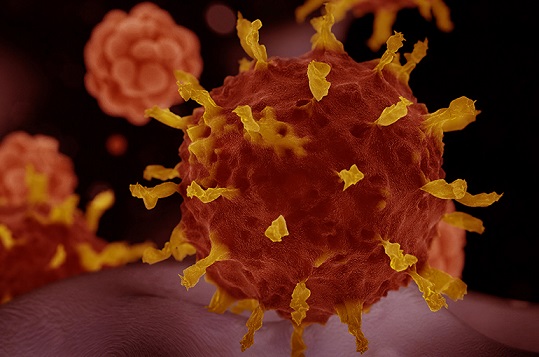Nikhil Prasad Fact checked by:Thailand Medical News Team Oct 27, 2025 3 months, 2 weeks, 3 days, 22 hours, 13 minutes ago
Medical News: Scientists uncover how a viral enzyme hijacks human cells
Researchers from Vanderbilt University have made a significant breakthrough in understanding how SARS-CoV-2, the virus responsible for COVID-19, manipulates the body’s immune defenses. The study focuses on a crucial viral component known as Macrodomain 1 (Mac1), part of the virus’s nonstructural protein 3 (nsp3), which plays an essential role in evading immune detection and ensuring viral survival.
 SARS-CoV-2 Macrodomain 1 Disarms Immune Defenses and Targets Protein Folding
SARS-CoV-2 Macrodomain 1 Disarms Immune Defenses and Targets Protein Folding
The team—comprising Crissey D. Cameron, Grace Heilmann, and Lars Plate from Vanderbilt University’s Departments of Chemistry, Biological Sciences, and Pathology, Microbiology, and Immunology—set out to identify how Mac1 interacts with human proteins and suppresses immune functions. The researchers explained to Thailand
Medical News, that Mac1 acts by removing a molecular tag called ADP-ribose, a small chemical group that human cells use to regulate immune signaling and DNA repair.
Mapping the viral enzyme’s targets
To pinpoint Mac1’s cellular targets, the scientists used advanced protein-mapping technology on human cell lines (HEK293T and A549 lung cells). They compared the normal version of Mac1 with a modified version known as N40D, which cannot break down ADP-ribose but can still bind to other proteins. This comparison allowed them to identify the viral enzyme’s likely victims.
Their experiments revealed that Mac1 interacts with a wide array of human proteins involved in essential processes like DNA damage repair, cytoskeletal stability, and cell cycle regulation. In lung cells, the researchers found strong evidence that Mac1 targets proteins from the TRiC complex—a group of molecular chaperones responsible for correctly folding about 10 percent of all human proteins. By interfering with TRiC, the virus could destabilize normal cell function and enhance its own replication efficiency.
A deeper look into viral manipulation
The Vanderbilt team discovered that several of Mac1’s key partners, such as EIF4A1/2, MEPCE, and NADK2, are associated with energy metabolism and the body’s response to stress and infection. In lung cells, Mac1 also interacted with interferon-related proteins like SAMHD1 and YWHAZ—molecules that normally help mount antiviral defenses. The findings suggest that the viral enzyme doesn’t just hide from the immune system but actively rewires critical pathways involved in inflammation, protein synthesis, and cell repair.
Additionally, several members of the TRiC complex involved in protein folding were selectively enriched with mutant Mac1 from A549 cells. These findings suggest a novel role of Mac1 in regulating host protein folding.
The researchers believe that this enzyme’s broad range of interactions explains why SARS-CoV-2 remains such a persistent and adaptable pathogen. Because Mac1 is conserved ac
ross nearly all coronavirus strains, it represents a potential universal target for future antiviral drugs.
Potential for new antiviral strategies
By mapping Mac1’s “interactome”—the network of human proteins it manipulates—the study provides a roadmap for developing treatments that could block its ADP-ribosyl hydrolase activity. Disabling Mac1 could restore the body’s natural immune signaling and reduce viral replication efficiency without directly targeting viral replication enzymes that tend to mutate quickly.
The researchers emphasized that targeting Mac1’s interactions, particularly with the TRiC protein-folding complex, might open a new therapeutic avenue for treating not just COVID-19 but future coronavirus outbreaks.
Conclusion
The study highlights how SARS-CoV-2 uses the Macrodomain 1 enzyme as a molecular weapon to interfere with human immune regulation, DNA repair, and protein folding. These insights deepen our understanding of how the virus undermines the body’s defenses at a cellular level. Future drugs that inhibit this viral enzyme could become a cornerstone of next-generation antiviral therapy, potentially offering protection even against emerging variants.
The study findings were published on a preprint server and are currently being peer reviewed.
https://www.biorxiv.org/content/10.1101/2025.10.21.683784v1
For the latest COVID-19 News, keep on logging to Thailand
Medical News.
Read Also:
https://www.thailandmedical.news/articles/coronavirus
